Editing audio can be a lengthy process, but AI-powered tools have transformed the industry, making it faster and more efficient. Whether you’re a podcaster, musician, or content creator, these AI tools can help you enhance your audio with minimal effort. Below is a list of the 10 best AI audio editing tools, each offering unique features to suit different needs.

Table of Contents
ToggleWhat Makes an Audio Editor the Best?
Choosing the best audio editor depends on your specific projects, but several essential features set top-notch audio editing tools apart:
- User-Friendly Interface: A clean, intuitive design ensures a smooth editing experience, especially for beginners.
- Comprehensive Editing Features: Tools like multi-track editing, the ability to add effects (reverb, compression, equalization), and essential functions (cut, copy, paste) are key for professional audio production.
- AI Integration: Automatic noise reduction, speech enhancement, and smart equalization powered by AI can save time and significantly improve audio quality.
- Compatibility with Other Tools: The best editors integrate seamlessly with different file formats and other software like DAWs or video editors, enhancing the workflow.
- Real-Time Processing: Real-time effects help users hear changes instantly, leading to a more dynamic editing process.
- Batch Processing: This feature is crucial for handling multiple audio files simultaneously, speeding up workflow.
- Collaboration Tools: Cloud storage and version control are essential for team projects, streamlining the editing process.
- High-Quality Export Options: Exporting in various high-quality formats is essential for delivering professional audio results.
- Support & Resources: Tutorials, customer support, and strong user communities help users troubleshoot and improve their skills.
- Affordable Pricing: Tools that offer pricing models—whether through subscriptions or one-time purchases—make it easier to find a solution that fits your budget.
When selecting an audio editor, consider which features best align with your project needs, whether it’s editing podcasts, music, or sound effects.
Best AI Tools for Audio Editing
1. Auphonic
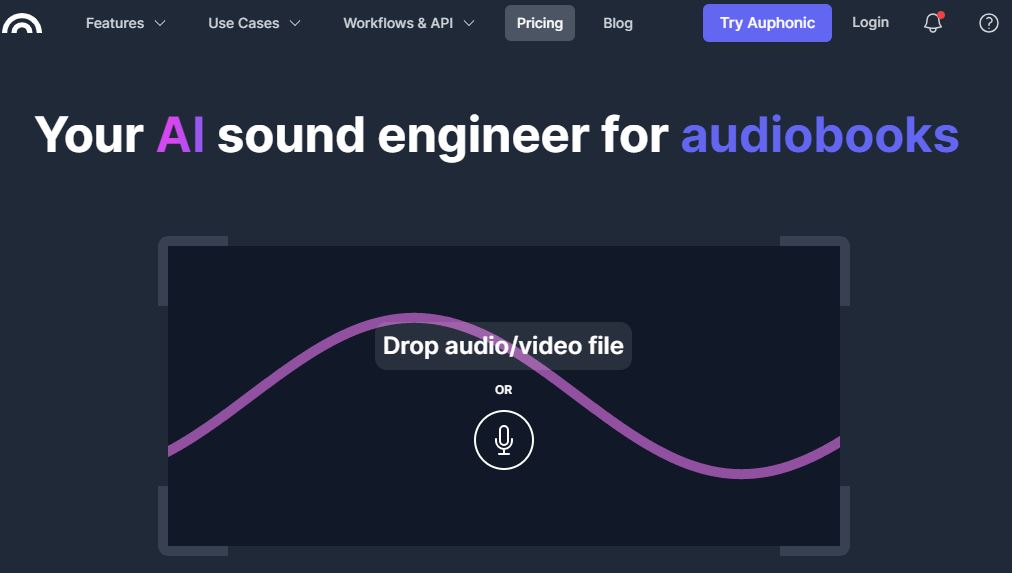
Auphonic is an AI-powered audio post-production tool designed to optimize audio files for podcasts, radio shows, and other media. It simplifies loudness normalization, noise reduction, and encoding, making it popular among podcasters and broadcasters.
Key Features:
- Automatic Loudness Normalization: Adjusts loudness to meet international broadcast standards.
- Adaptive Leveler: Smoothens volume fluctuations in speech or music.
- Noise and Hum Reduction: Cleans background noise, hums, and hiss.
- Multi-track Input: Allows processing of separate tracks.
- Speech Recognition: Transcribes speech into text with high accuracy.
Pros:
- Easy to use, beginner-friendly interface.
- Customizable output settings.
- High-quality noise reduction.
- Time-saving automation features.
Cons:
- Limited advanced editing features.
- Free version only allows processing up to 2 hours of audio per month.
Also Read: Can WooCommerce Do a 75 000 ACH Payment?
2. Adobe Podcast (Project Shasta)

Adobe Podcast, originally known as Project Shasta, is a web-based AI-powered audio editor designed specifically for podcast creators. It offers an intuitive interface, AI-powered transcription, and sound enhancement tools.
Key Features:
- AI Transcription: Converts spoken words into text for easy editing.
- Enhanced Speech: Automatically cleans and improves the clarity of voice recordings.
- Multi-track Editing: Supports multiple audio tracks for podcast production.
- Script-based Editing: Allows editing audio by editing the transcription.
- Seamless Collaboration: Cloud-based collaboration for team editing.
Pros:
- Excellent for podcast production and collaboration.
- Automatic noise reduction and speech enhancement.
- Transcription-based editing simplifies workflow.
Cons:
- Still in beta, limited feature set compared to Adobe Audition.
- Cloud-based storage can be restrictive for large projects.
3. Descript
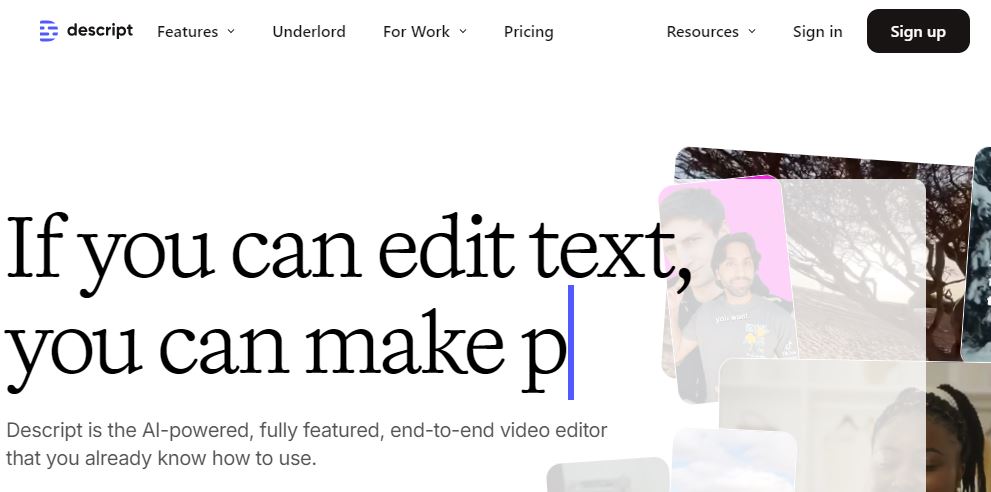
Descript is an all-in-one tool that combines transcription, audio editing, and video editing. It’s known for its unique text-based audio editing feature, making it a great choice for podcasters and content creators.
Key Features:
- Overdub: AI-generated voice cloning for fixing mistakes or adding words.
- Text-based Audio Editing: Edit audio by cutting or adding words in the transcription.
- Multi-track Editing: Supports complex editing of multiple tracks.
- Noise Reduction: Built-in AI-powered tools for removing background noise.
- Screen Recording: Includes video editing tools for podcasters who also work with video content.
Pros:
- Highly intuitive and easy to learn.
- Overdub feature is innovative and time-saving.
- Useful for both audio and video projects.
Cons:
- Expensive for premium features.
- Limited control over detailed audio editing (EQ, compression).
4. Cleanvoice
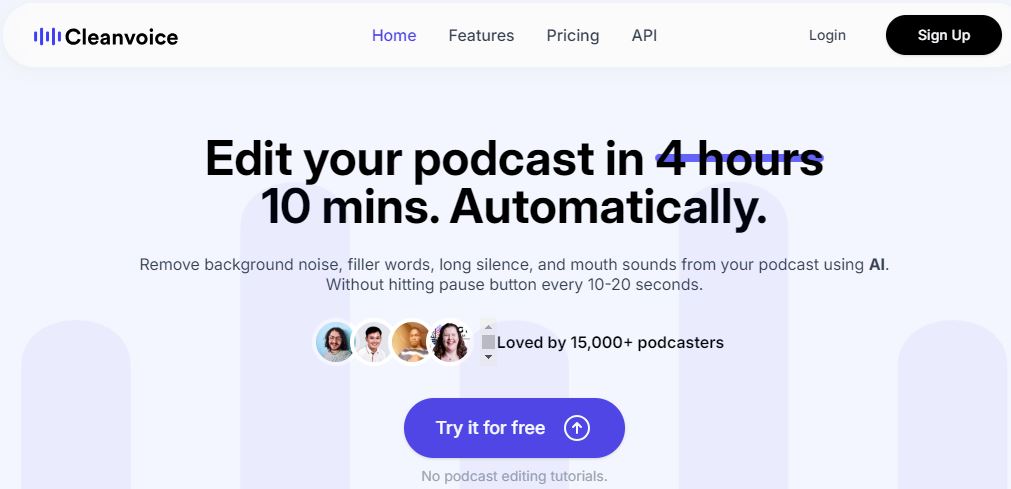
Cleanvoice is an AI tool built specifically for cleaning up audio files. It focuses on removing filler words, silences, and background noise, making it a perfect companion for podcast editors.
Key Features:
- Filler Word Removal: Automatically detects and removes “ums,” “ahs,” and other filler words.
- Background Noise Reduction: AI-powered algorithms remove noise without affecting voice clarity.
- Multiple Language Support: Works with different languages for podcasts.
- Automatic Silence Trimming: Cuts out long silences in recordings.
Pros:
- Effective at removing filler words.
- Great for speeding up podcast production.
- Affordable and simple to use.
Cons:
- Lacks advanced audio editing features.
- Limited to podcast-related noise cleaning.
5. Krisp
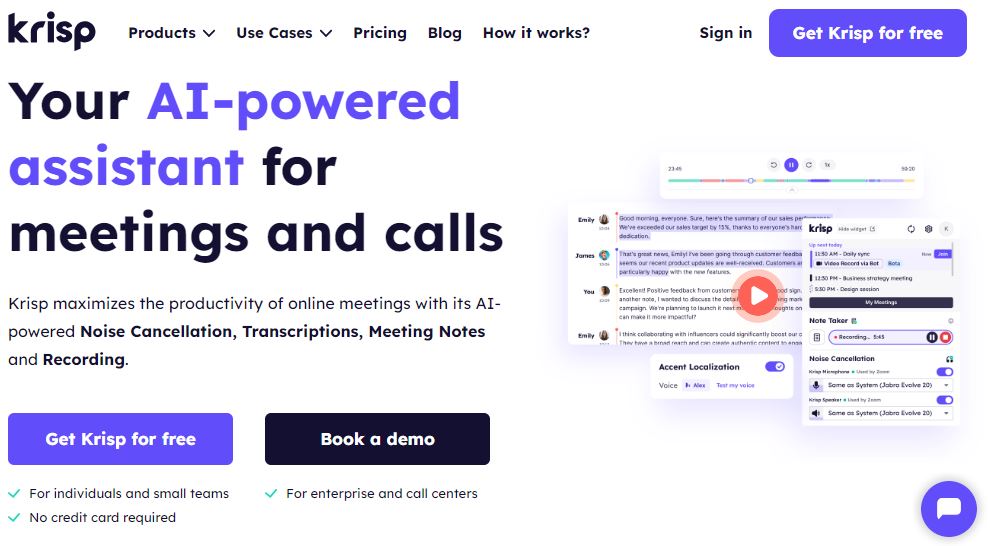
Krisp is an AI-based noise-canceling app that removes background noise in real-time. It’s highly useful for improving the quality of live calls, recordings, and podcasts, especially in noisy environments.
Key Features:
- Real-time Noise Cancellation: Filters out background noise in real-time during calls and recordings.
- Echo Cancellation: Removes echo from audio inputs.
- Voice Cancellation: Isolates a specific voice and cancels out others.
- Multi-platform Support: Works with most communication apps like Zoom, Skype, and Slack.
Pros:
- Impressive real-time noise removal.
- Lightweight and easy to use.
- Works across multiple platforms.
Cons:
- Free version limits usage to 240 minutes per week.
- Lacks comprehensive audio editing tools.
6. Sonible Smart
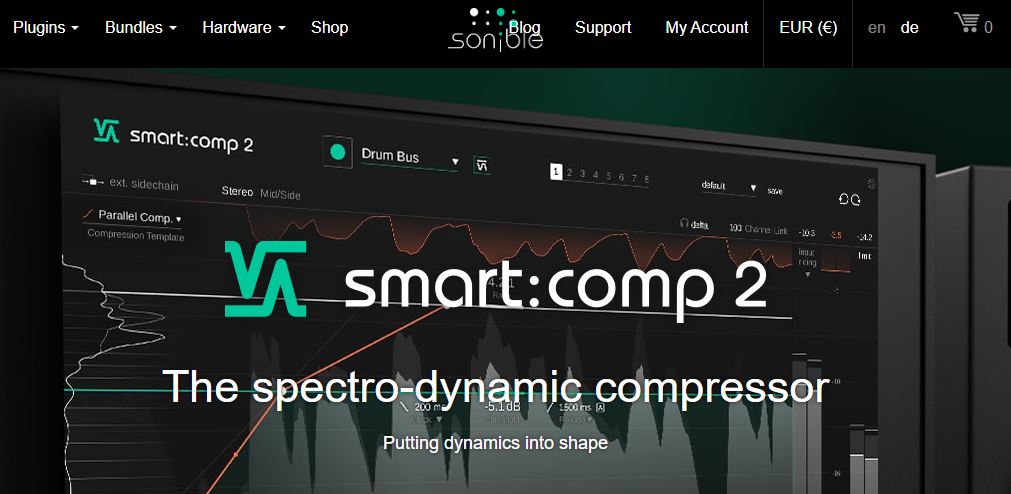
Sonible Smartis an AI-powered equalizer plugin that automatically analyzes and adjusts the frequency spectrum of your audio tracks. It’s particularly useful for music producers and sound engineers.
Key Features:
- AI-based EQ Adjustments: Automatically corrects tonal imbalances in audio.
- Custom Profiles: Provides tailored EQ profiles for various types of audio, including vocals and instruments.
- Real-time Processing: Delivers instant results with minimal latency.
- Manual Fine-tuning: Allows for precise adjustments beyond automatic corrections.
Pros:
- Excellent for fine-tuning audio tracks.
- Saves time for professional engineers.
- Adaptive to various types of audio content.
Cons:
- Not beginner-friendly.
- Limited to EQ functionalities, lacking other audio editing tools.
7. RX 9 by iZotope
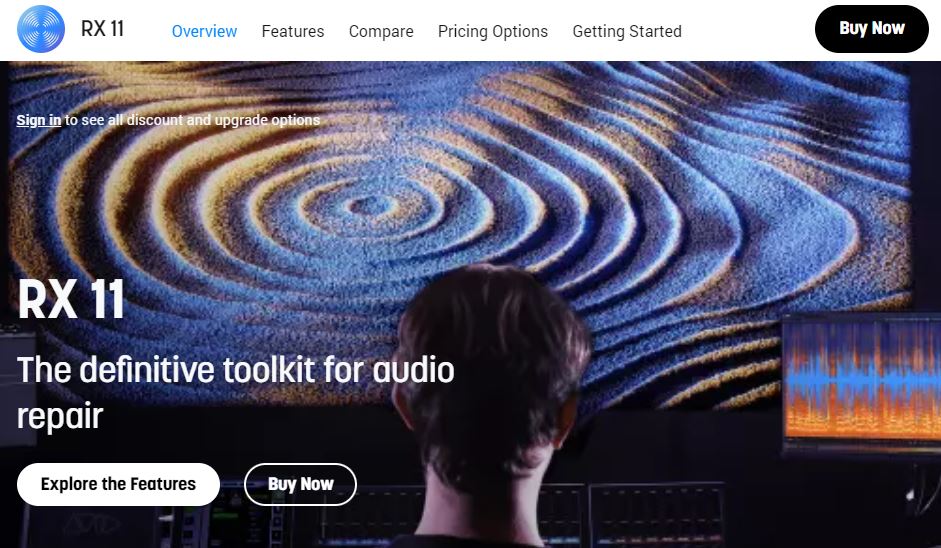
RX 9 by iZotope is a professional-grade audio repair and enhancement tool widely used in music and post-production. Its AI-powered features help clean up damaged audio, reduce noise, and remove unwanted sounds.
Key Features:
- De-hum and De-noise: Automatically removes electrical hums and background noise.
- Spectral Repair: Visually identifies and removes unwanted audio artifacts.
- Dialogue Isolation: Separates speech from background noise in dialogue-heavy recordings.
- Advanced Audio Restoration: Tools for removing clicks, pops, and clipping.
Pros:
- Industry-standard audio restoration tool.
- Powerful for noise reduction and sound repair.
- Excellent for professional audio post-production.
Cons:
- Expensive and complex for beginners.
- Requires a powerful computer for best performance.
8. Landr
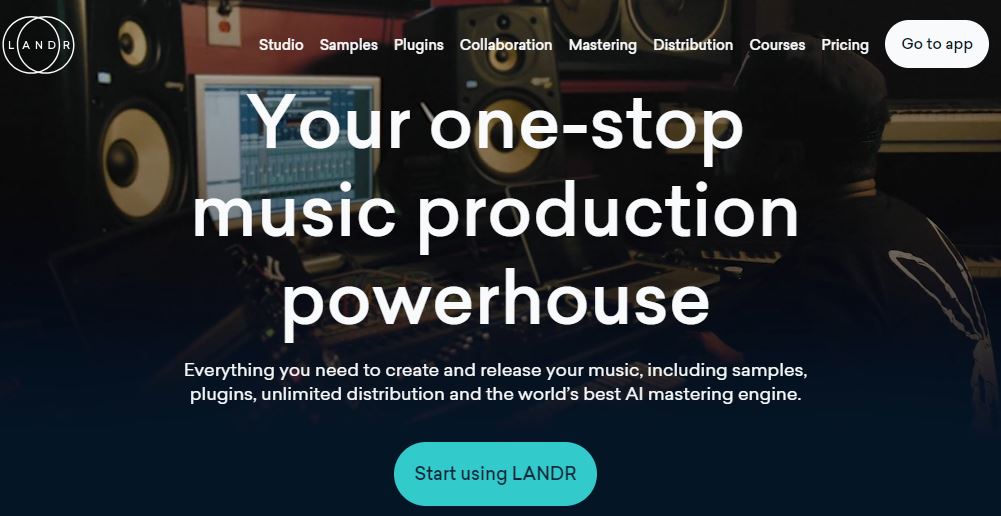
Landr is an AI-powered mastering tool that enables musicians to create polished tracks without requiring a professional sound engineer. Its AI algorithms analyze and optimize audio for streaming platforms.
Key Features:
- AI Mastering: Automatic mastering for different audio genres.
- Metadata Management: Embeds metadata in your tracks for distribution.
- Cloud Storage: Provides cloud storage for mastering projects.
- Instant Feedback: Offers suggestions and feedback on how to improve tracks.
Pros:
- Excellent for quick and easy mastering.
- Affordable for indie musicians.
- Supports high-quality audio formats.
Cons:
- Limited customization options for experienced engineers.
- Only useful for final mastering, not detailed editing.
Also Read: Can’t Type Into Short Description Text Field for WooCommerce Products
9. Podcastle

Podcastle is a comprehensive AI-based audio and podcast production tool that offers features like text-to-speech, voice cloning, and noise cancellation. It’s designed to make podcast production more accessible to beginners.
Key Features:
- Magic Dust: AI-based sound enhancement for improving audio quality.
- Text-to-Speech: Converts written text into spoken words.
- Multi-track Editing: Supports multiple tracks for detailed audio editing.
- AI Noise Cancellation: Automatically reduces background noise.
Pros:
- User-friendly and easy to learn.
- Affordable with various advanced features.
- Great for podcasting and voice work.
Cons:
- Text-to-speech voices sound robotic in some cases.
- Limited advanced sound design tools for professionals.
10. AudioShake
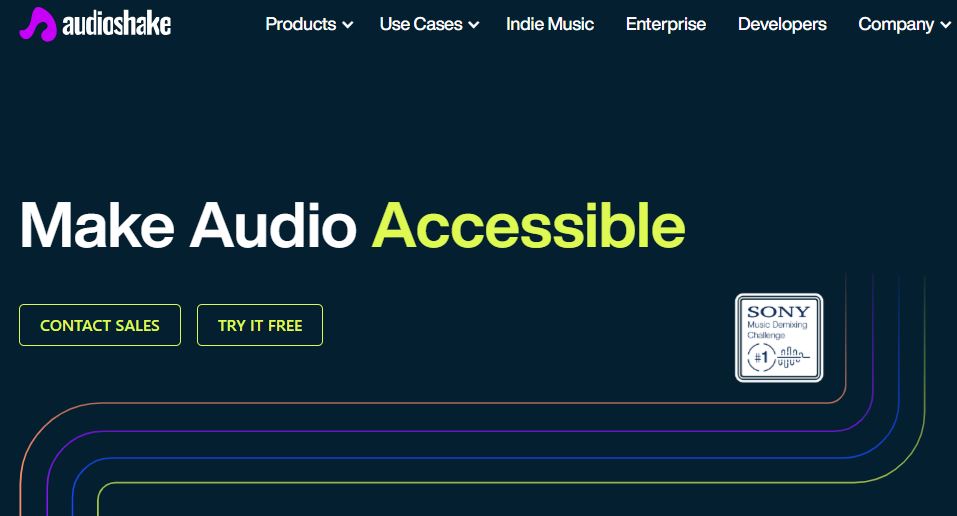
AudioShake is a unique AI tool that uses deep learning to separate audio stems. This tool is invaluable for remixing tracks, restoring old recordings, or isolating instruments in a mix.
Key Features:
- AI Stem Separation: Splits tracks into individual stems like vocals, drums, and bass.
- Real-time Processing: Fast stem separation with minimal latency.
- Supports Multiple Formats: Works with various audio formats for flexibility.
- High-quality Separation: Maintains audio fidelity while separating stems.
Pros:
- Excellent for remixing and audio restoration.
- Easy to use, with fast results.
- Ideal for musicians and producers.
Cons:
- Limited to stem separation; lacks full-fledged audio editing capabilities.
- Can be expensive depending on usage.
Quick Look: Best Audio Editing Software Options
| Tool | Key Features | Price (Starting) | Best For | Pros | Cons |
|---|---|---|---|---|---|
| Auphonic | Noise reduction, loudness normalization, speech recognition | Free/ $11+ | Podcasters, Broadcasters | Easy to use, great for noise reduction | Limited advanced editing tools |
| Adobe Podcast | AI transcription, enhanced speech, multi-track editing | Free (Beta) | Podcast creators | Script-based editing, collaboration features | Limited advanced features |
| Descript | Text-based editing, Overdub, screen recording | $12+/month | Podcasters, Video creators | Intuitive interface, Overdub feature | Expensive for premium features |
| Cleanvoice | Filler word removal, noise reduction | $10+/month | Podcast editors | Effective filler word removal, time-saving | Lacks advanced audio editing |
| Krisp | Real-time noise cancellation, echo removal | Free/$5+/month | Call quality, Live recordings | Real-time noise removal | Limited free version |
| Sonible Smart | AI-based EQ adjustments, custom profiles | $129+ | Music producers, Engineers | Excellent audio correction | Not beginner-friendly |
| RX 9 by iZotope | De-noise, de-hum, dialogue isolation | $299+ | Professional audio post-production | Industry-standard noise reduction | Expensive, complex for beginners |
| Landr | AI mastering, metadata management | $12+/month | Indie musicians, Producers | Fast, effective mastering | Limited customization |
| Podcastle | Text-to-speech, multi-track editing, noise cancellation | Free/$12+/month | Podcast creators | User-friendly, great for podcasting | Robotic text-to-speech voices |
| AudioShake | AI stem separation, multi-format support | $39+ per track | Musicians, Producers | High-quality stem separation | Limited to stem separation functions |

Final Thought on AI Tools for Audio Editing
AI tools for audio editing have drastically improved workflows for podcasters, musicians, and audio professionals. Whether you’re looking for advanced noise reduction, automatic mastering, or real-time audio correction, there’s an AI tool that fits your needs.
Interesting Reads
Does WooCommerce Charge Transaction Fees?



